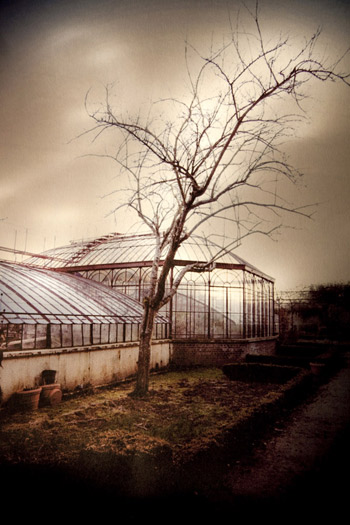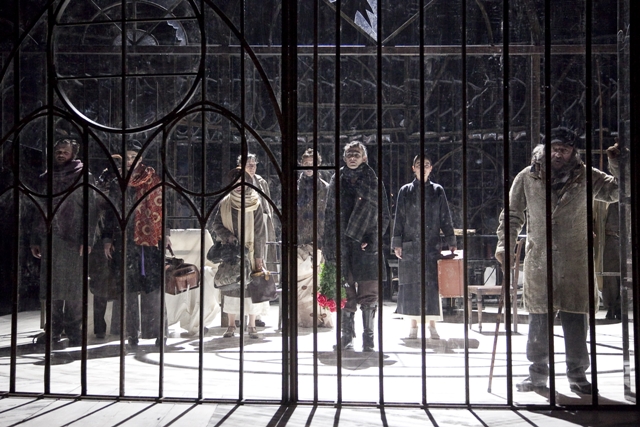Cherry Orchard and Why they hate us!
 So what actually happens when you take Chekhov at his word, when characters are the delusions they invent just to keep their personalities together, when Chekhov—so appropriately—grows into a post-Lacanian world. People hate you for it: intensely!
So what actually happens when you take Chekhov at his word, when characters are the delusions they invent just to keep their personalities together, when Chekhov—so appropriately—grows into a post-Lacanian world. People hate you for it: intensely!Aside from Kolyada's Hamlet perhaps (and my head is still reeling from that pagan/neo-dadaist orgy at the Atelier Berthier, so I can't be sure) this was the coolest reception of any performance I have ever seen in Paris.
Several American looking people (and I'm not suggesting they were Americans) left rudely during the performance. My next-seat neighbor was an assertive young Hungarian theatre student: poor in french, precise in British english and meticulously familiar with the text of the play. This production infuriated her. She methodically found every imaginable reason to dismiss it.
How do you explain a radically Lacanian treatment of "Cherry Orchard" to someone who hasn't or won't reach the work of Jacques Lacan and his successors?
No, you absolutely don't!
So, do we act stupid—like back home—likable, not-too-smart, fungible, non-threatening, "nice" guys, obscuring the multitude of conformist sins? Do you kill the theatre except as an “entertainment commodity” (e.g., the vacuity of Kushner or Mark Morris): obediently oblivious to the evolution of humanity and the survival of civilization?
Well, just how fungible R U?
 Brochen was imaginative and explicit in her human project. She inserted a mysterious and distinct cast member, a magician, to appear before the final stretch of the no-intermission drama: without comment or excuse. This clad-in-black, no-faced giant with ornate golden cape and towering mitre simply wanders to the center of the stage. In puzzling silence, he/she/it conjures up a crystal ball from behind a scarf held at arms' length. The glittering object coyly peers over the top, climbs the neck of the conjuror, suspends in the air and then almost hides again as it transforms into a crystal, glittering mask which this mysterious big Other places over the black void of it's face!
Brochen was imaginative and explicit in her human project. She inserted a mysterious and distinct cast member, a magician, to appear before the final stretch of the no-intermission drama: without comment or excuse. This clad-in-black, no-faced giant with ornate golden cape and towering mitre simply wanders to the center of the stage. In puzzling silence, he/she/it conjures up a crystal ball from behind a scarf held at arms' length. The glittering object coyly peers over the top, climbs the neck of the conjuror, suspends in the air and then almost hides again as it transforms into a crystal, glittering mask which this mysterious big Other places over the black void of it's face!Of course, this is magic.
The characters of the play feel very different. They are not the archived haute bourgeois of bygone Never-land. They act like us without pompous solemnity and, I think, this is what makes the audience so angry. These resurrected characters are always acting out, frantically just pretending what they want people to see, in the same manic royaume des ombres that we inhabit, reminding me of FaceBook®: a milieu of edited personalities, fantasies that demand and receive acceptance, even enthusiasm, because they're solely created to be accepted. A Truman Show for each hungry user, reality is kept at bay: Cherry Orchard!
 |
| Only FaceBook? |
